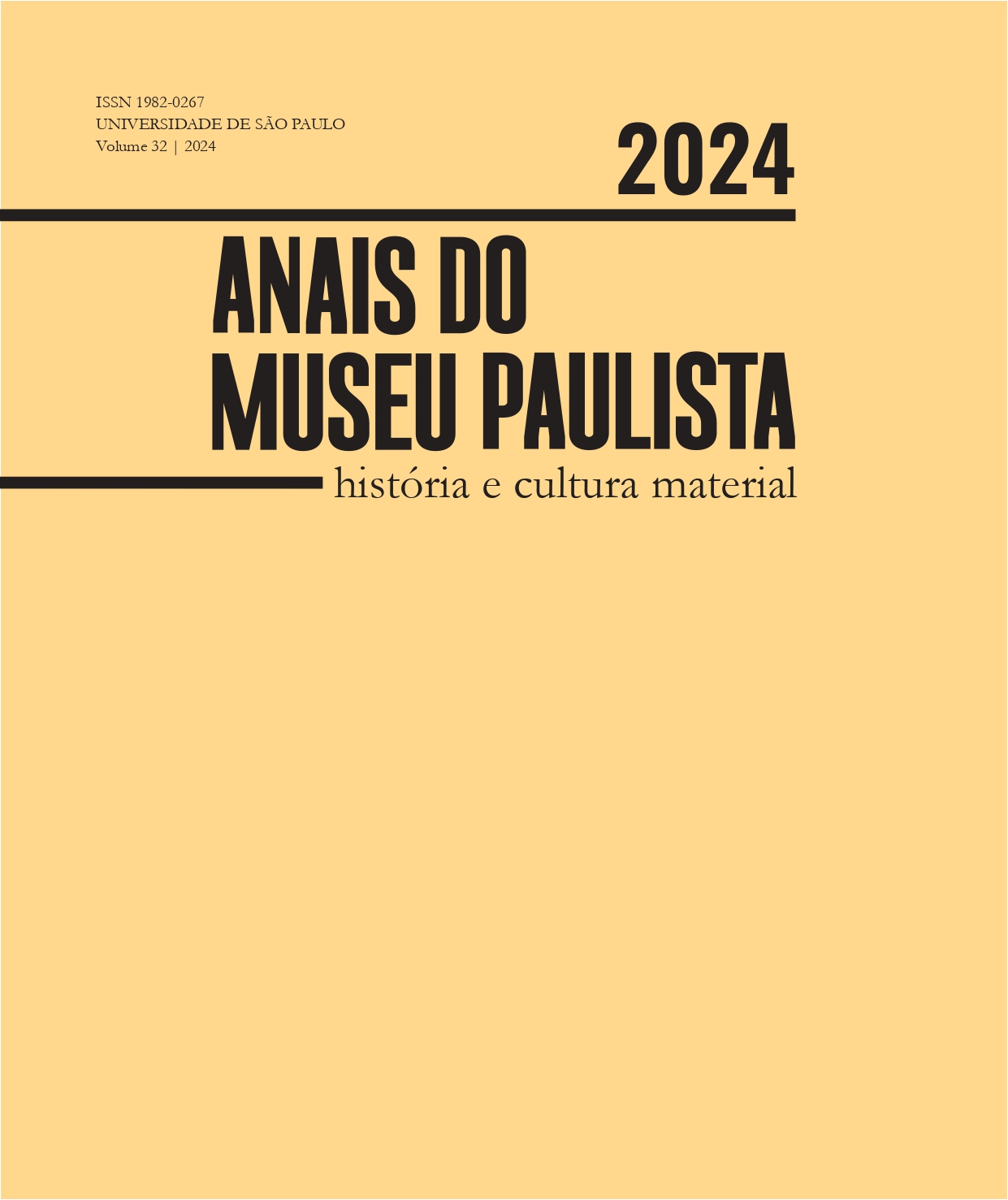Introduction to the dossier “Producing, accumulating and transmitting knowledge in the Portuguese empire: material practices, visual artifacts and creativity
DOI:
https://doi.org/10.11606/1982-02672024v32e37Downloads
References
BRACHT, Fabiano; CONCEIÇÃO, Gisele C.; POLÓNIA, Amélia (ed.). Connecting worlds: production and circulation of knowledge in the First Global Age. Newcastle upon Tyne: Cambridge Scholars Publishing, 2018.
CAÑIZARES-ESGUERRA, Jorge. Nature, empire, and nation: explorations of the history of science in the Iberian world. [S. l.]: Stanford University Press, 2006.
CURTO, Diogo Ramada. Cultura imperial e projetos coloniais. Campinas: Unicamp, 2009.
DANTES, Maria Amélia M. Integrando o Brasil à América Latina: um movimento da historiografia dos anos de 1980. In: ANDRADE, Ana Maria Ribeiro de (org.). Caminho para as estrelas: reflexões em um museu. Rio de Janeiro: Mast, 2007. p. 112-125.
DANTES, Maria. Relações científicas e tradições científicas locais: modelos institucionais no Brasil no final do século XIX. In: GOLDFARB, Ana M.; MAIA, Carlos A. (org.). História da ciência: o mapa do conhecimento. São Paulo: Edusp, 1995.
FARIA, Miguel Figueira de. Da facilitação e da ornamentação: a imagem nas edições do Arco do Cego. In: CAMPOS, Fernanda Maria Guedes de et al. (org.). A Casa Literária do Arco do Cego, 1799-1801. Lisboa: Biblioteca Nacional, 1999. p. 107-137.
FIGUEIRÔA, Silvia F. de M.; LOPES, Maria Margaret (org.). Geological sciences in Latin America. Campinas: Unicamp, 1995.
FINDLEN, Paula (ed.). Empires of knowledge: scientific networks in the early modern world. New York: Routledge, 2018.
HADDAD, Thomás A. S.; SILVA, Matheus Alves Duarte da; RAJ, Kapil Raj (ed.). Beyond science and empire: circulation of knowledge in an age of global empires, 1750-1945. Abingdon: Routledge, 2023.
HOLANDA, Sérgio Buarque de. Caminhos e fronteiras. 3. ed. São Paulo: Cia. das Letras, 1994.
KANTOR, Iris; CRUZ, Milena N. Ethno-geographies in the making of enlightenment cartography: the mural maps of Jean Janvier and Sébastien-G. Longchamps (1754). Journal18: EighteenthCentury Art and Culture Journal, v. 13, p. 1-12, 2022.
KANTOR, Iris; HADDAD, Thomás A. S. Mapping skies and continents: the production of two Portuguese scientific atlases in the era of Napoleonic expansion (1799-1813). Culture & History Digital Journal, v. 10, e020, 2021.
KURY, Lorelai. Iluminismo e Império no Brasil: o patriota (1813-1814). Rio de Janeiro: Fiocruz, 2007. v. 1, 200 p.
LAFUENTE, Antonio et al. Las dos orillas de la ciência: la traza pública e imperial de la ilustración española. Madrid: Marcial Pons, 2012.
LAFUENTE, Antonio; ALONSO, Andoni; RODRÍGUEZ, Joaquín. ¡Todos sabios!: ciencia ciudadana y conocimiento expandido. Madrid: Cátedra, 2013.
LAFUENTE, Antonio; SALA CATALA, José. Ciencia colonial y roles profesionales en la América española del siglo XVIII. Revista Latinoamericana de História de las Ciencias y la Tecnologia – Quipu, v. 6, n. 3, p. 387-403, 1989.
LATOUR, Bruno. Visualisation and cognition: thinking with eyes and hands. In: KUKLICK, Henrika (ed.). Knowledge and society: studies in the sociology of culture past and present. Greenwich: Jai Press, 1986.
LEONG, Elaine. Recipes and everyday knowledge: medicine, science and the household in early modern England. Chicago: University of Chicago Press, 2018.
LEONG, Elaine. Translating medicine across premodern worlds. Osiris, v. 37, 2022.
PALLADINO, Paolo S. A. Transhumance revisited: on mobility and process between ethnography and history. Journal of Historical Sociology, v. 31, n. 2, p. 175-184, 2018.
PATACA, Ermelinda; LUNA, Fernando. Frei Veloso: Tipografia do Arco do Cego. São Paulo: Edusp, 2019.
POLÓNIA, Amélia. Women as go-betweens in processes of cultural encounters: the portuguese overseas empire case study (1500-1700). In: BRACHT, Fabiano; CONCEIÇÃO, Gisele C.;
POLÓNIA, Amélia (ed.). Connecting worlds: production and circulation of knowledge in the first global age. Newcastle upon Tyne: Cambridge Scholars Publishing, 2018.
PRATT, Mary Louise. Arts of the contact zone. New York: Modern Language Association, 1991.
RAJ, Kapil. Relocating modern science: circulation and the construction of knowledge in South Asia and Europe, 1650-1900. New York: Palgrave Macmillan, 2007.
SCHAFFER, Simon et al. (ed.). The brokered world: go-betweens and global intelligence, 1770-1820. Sagamore Beach: Science History Publications, 2009.
SCHIAVINATTO, Iara Lis Franco. Visualidade e poder: ensaios sobre o mundo lusófono, 1770-1840.Campinas: Unicamp, 2022.
SCHIEBINGER, Londa. Women and gender in science and technology. New York: Routledge, 2014.
SECORD, James A. Knowledge in transit. Isis, v. 95, n. 4, p. 654-72, 2004.
SILVA, Márcia Regina Barros da. História e historiografia das ciências latino-americanas: Quipu (1984-2000). Revista Brasileira de História da Ciência, v. 7, p. 47-57, 2014.
SMITH, Pamela H. The body of the artisan: art and experience in the scientific revolution. Chicago: University of Chicago Press, 2004.
Downloads
Published
Issue
Section
License
Copyright (c) 2024 Iris Kantor, Gisele Cristina da Conceição

This work is licensed under a Creative Commons Attribution 4.0 International License.
Autores que publicam nesta revista concordam com os seguintes termos:
- Autores mantém os direitos autorais e concedem à revista o direito de primeira publicação, com o trabalho simultaneamente licenciado sob a Licença Creative Commons Attribution que permite o compartilhamento do trabalho com reconhecimento da autoria e publicação inicial nesta revista.
- Autores têm autorização para assumir contratos adicionais separadamente, para distribuição não-exclusiva da versão do trabalho publicada nesta revista (ex.: publicar em repositório institucional ou como capítulo de livro), com reconhecimento de autoria e publicação inicial nesta revista.
- Autores têm permissão e são estimulados a publicar e distribuir seu trabalho online (ex.: em repositórios institucionais ou na sua página pessoal) a qualquer ponto antes ou durante o processo editorial, já que isso pode gerar alterações produtivas, bem como aumentar o impacto e a citação do trabalho publicado (Veja O Efeito do Acesso Livre).



